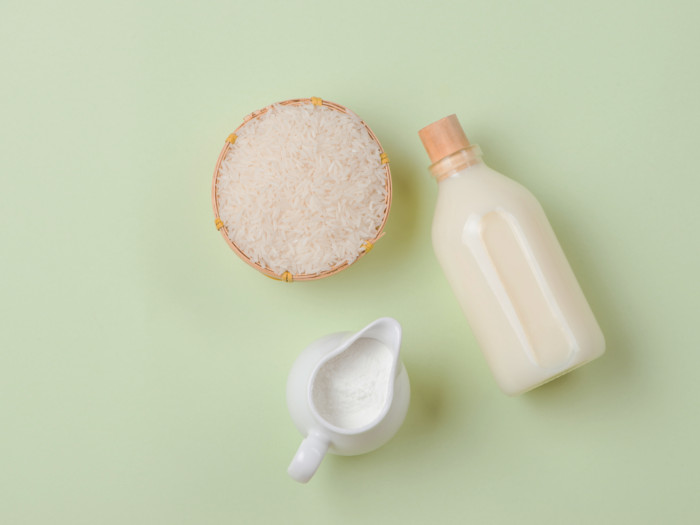Most vegans will have some experience with rice milk, but many other people are unaware of the potential benefits and rich nutrient supply in this dairy-free milk alternative.
What is Rice Milk?
Rice milk is a dairy-free type of milk that is prepared with boiled rice, and brown rice starch and syrup. There are no animal byproducts in this milk, making it a very popular option for vegetarians and vegans, while still delivering a number of critical nutrients. Furthermore, since it is a dairy-free option, there is also no lactose found in this rice-derived milk, so people with lactose intolerance often turn to this option. The flavor of unsweetened rice milk isn’t particularly appealing to many people, so it is often sweetened by manufacturers to more closely resemble traditional cow’s milk. [1]
Not only is this milk alternative ideal for vegans and those with lactose intolerance, but it is also a healthy option for other people who want a unique mineral and nutrient boost without taking in as much fat or calories. [2]

Rice milk is a grain milk made from rice. It is mostly made from brown rice and commonly unsweetened. Photo Credit: Shutterstock
| Serving Size : | |
|---|---|
| Nutrient | Value |
| Water [g] | 89.28 |
| Energy | 47 |
| Energy [kJ] | 195 |
| Protein [g] | 0.28 |
| Total lipid (fat) [g] | 0.97 |
| Ash [g] | 0.3 |
| Carbohydrate, by difference [g] | 9.17 |
| Fiber, total dietary [g] | 0.3 |
| Sugars, total including NLEA [g] | 5.28 |
| Calcium, Ca [mg] | 118 |
| Iron, Fe [mg] | 0.2 |
| Magnesium, Mg [mg] | 11 |
| Phosphorus, P [mg] | 56 |
| Potassium, K [mg] | 27 |
| Sodium, Na [mg] | 39 |
| Zinc, Zn [mg] | 0.13 |
| Copper, Cu [mg] | 0.04 |
| Manganese, Mn [mg] | 0.28 |
| Selenium, Se [µg] | 2.2 |
| Thiamin [mg] | 0.03 |
| Riboflavin [mg] | 0.14 |
| Niacin [mg] | 0.39 |
| Pantothenic acid [mg] | 0.15 |
| Vitamin B-6 [mg] | 0.04 |
| Folate, total [µg] | 2 |
| Folate, food [µg] | 2 |
| Folate, DFE [µg] | 2 |
| Choline, total [mg] | 2.1 |
| Vitamin B-12 [µg] | 0.63 |
| Vitamin B-12, added [µg] | 0.63 |
| Vitamin A, RAE [µg] | 63 |
| Retinol [µg] | 63 |
| Vitamin A, IU [IU] | 208 |
| Vitamin E (alpha-tocopherol) [mg] | 0.47 |
| Vitamin E, added [mg] | 0.13 |
| Vitamin D (D2 + D3), International Units [IU] | 42 |
| Vitamin D (D2 + D3) [µg] | 1 |
| Vitamin D2 (ergocalciferol) [µg] | 1 |
| Vitamin K (phylloquinone) [µg] | 0.2 |
| Fatty acids, total monounsaturated [g] | 0.63 |
| 16:1 [g] | 0 |
| 18:1 [g] | 0.62 |
| Fatty acids, total polyunsaturated [g] | 0.31 |
| 18:2 [g] | 0.31 |
| 18:3 [g] | 0.01 |
| Sources include : USDA [3] | |
Rice Milk Nutrition
This popular milk alternative has a wide range of impressive nutrients, including roughly 140 calories per cup, and only about 3 grams of fat – much less than 10 grams of fat in a cup of whole cow’s milk. There is no cholesterol in this milk variant, making it much better for heart health, and the majority of rice milk brands are fortified with other minerals. Since cow’s milk does provide a better range of minerals, rice milk often has added levels of calcium, B vitamins, iron, vitamin A and vitamin D, to make it roughly equivalent to cow’s milk. [4]
Rice Milk Health Benefits
The top health benefits of rice milk include aiding skin health, strengthening the bones, increasing energy metabolism and optimizing digestion, among others.
Skin Care
There are quite a few antioxidants and acids found in rice milk that can help the skin, including para-aminobenzoic acid, which is linked to protecting the skin from the damaging rays of the sun, reducing the appearance of wrinkles and blemishes. [5]
Prevents Chronic Disease
The various antioxidants that are found in rice can help to boost the overall strength of the immune system, helping the body resist oxidative stress and inflammation, which can lead to chronic diseases.
Reduces Cholesterol
There is no cholesterol in this milk variety, which is good news for people struggling with obesity and cardiovascular issues. Drinking this can lower your risk of atherosclerosis, heart attacks, and strokes. [6]
Improves Bone Density
Due to the fortification of most types of rice-derived milk, there are plenty of minerals, including calcium, vitamin D, iron and magnesium, which can help lower your risk of osteoporosis as you age. [7]
Boosts Digestion
Due to the lack of lactose in this milk alternative, it is easier on the digestive system and can promote improvement in the bacterial environment of your gut, protecting you against infection and indigestion. [8]
Rice Milk vs Almond Milk
The primary difference between rice milk and almond milk is the source of the milk. Almond milk is made with ground-up almonds, similar to the process of making rice-flavored milk, but the fat content, calorie count and active ingredients in the milk are completely different. That being said, almond milk and rice milk are both lactose-free and are popular plant milk varieties in various parts of the world. Furthermore, neither of these are natural sources of calcium or vitamin D, so they are both typically fortified beverages. [9]
